Middle East
Top UK barrister: Israel is carrying out ‘destruction of humanity’ in Gaza | Israel-Palestine conflict News
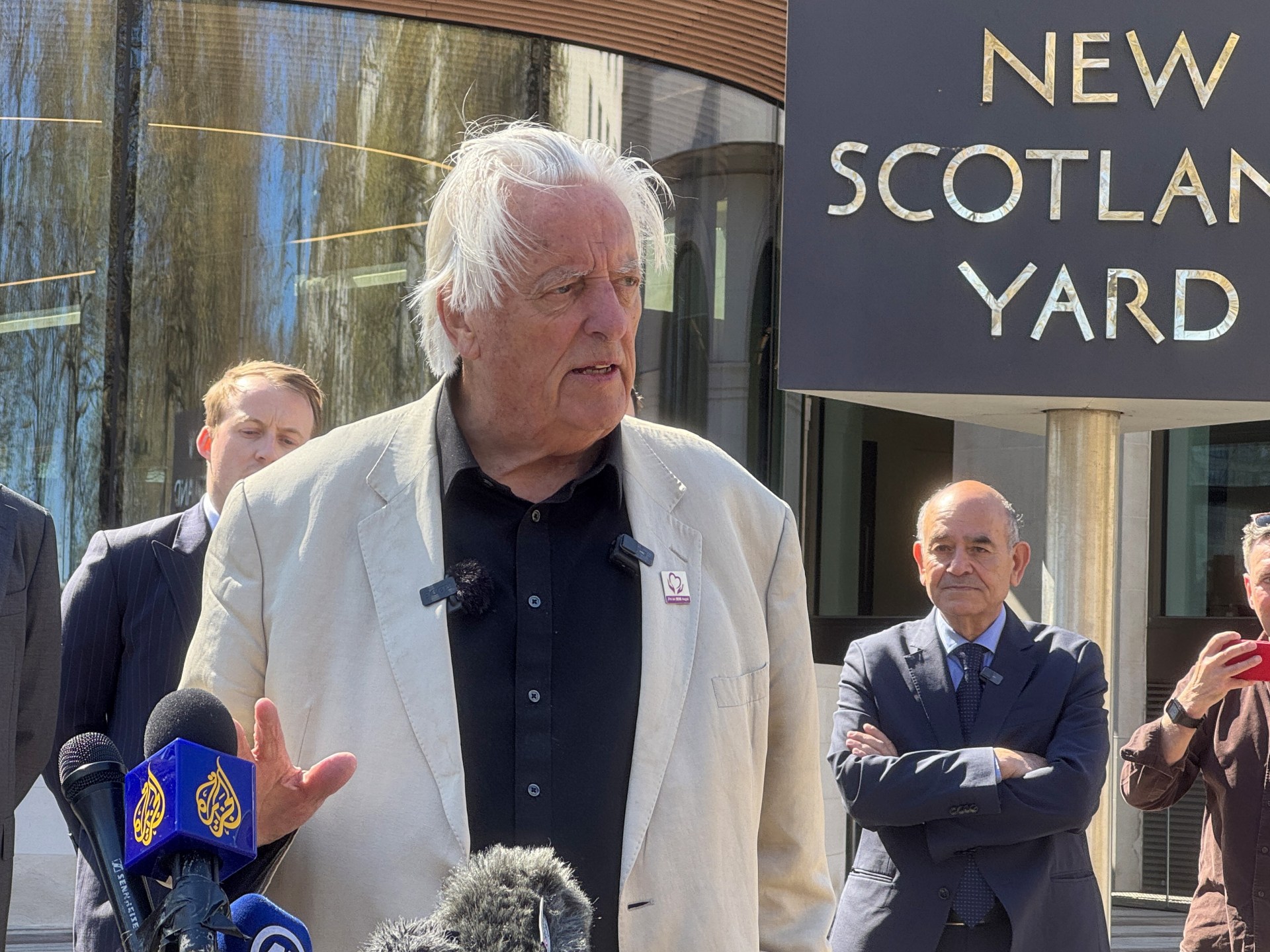
London, United Kingdom – Ten British citizens, including dual nationals, who have served in the Israeli army are being accused of war crimes in Gaza.
They are suspected of acts such as “murder, extermination, attacking civilians, and deportation or forcible transfer of population”, according to the Palestine-based Palestinian Centre for Human Rights and the UK-based Public Interest Law Centre, which last week submitted a 240-page report to the Metropolitan Police’s War Crimes Unit.
Michael Mansfield, 83, a leading English barrister who has worked on several high-profile cases throughout his career and is dubbed “the king” of human rights work, was among those who handed over the dossier that took a team of lawyers and researchers in Britain and The Hague six months to compile.
Dozens of other barristers, lawyers, researchers and human rights practitioners have signed a letter of support, urging the Met’s war crimes team to investigate the complaints.
Due to legal reasons, neither the names of the suspects, some of whom worked at the officer level, nor the report in full are being made public. Alleged war crimes from October 7, 2023, to May 31 are documented in the file, which is based on open-source material and witness testimonies.
Al Jazeera interviewed Mansfield about the landmark case, his views on Israel’s genocide against Palestinians in Gaza and why he believes legal efforts against those involved in the onslaught remain important, even as critical rulings are ignored by those in power and mass killings continue unabated.
Al Jazeera: What can you tell us about the case?
Michael Mansfield: The reason I can’t talk about the detail of it is perhaps obvious: … The people [accused] would immediately know who they were.
If a UK national commits any serious crime abroad, … you are liable to be and are investigated, arrested, charged and tried here in the United Kingdom. This is nothing out of the ordinary in that sense.
The out-of-the-ordinary bit, of course, is that it is linked to war crimes and crimes against humanity, which are international crimes.
The United Kingdom can obviously investigate themselves, or the International Criminal Court can investigate and charge and so forth.
Nobody can be unaware of the extent of the devastation, particularly in Gaza, although that’s not the only place in the world where such things are happening. And in relation to those matters, the public are asking, “What are we doing about it? What can we do about it?”
The international institutions of justice and conventions on human rights were established just after the Second World War in order to prevent this happening, if at all possible, by intervening.
[But] the United Nations’s ability to intervene has been emasculated by the major nations – Russia and America nearly always opposing each other. On top of that, the United Kingdom sitting on the fence and abstaining on most of these issues.
Slowly but surely, all the principles to do with the rule of law and rules-based democracy have been, essentially, denuded from practicality.
The court finds it very difficult to do anything because the countries [allegedly behind war crimes] are seemingly immune. They don’t mind what the international courts may think – either the International Criminal Court [or the] International Court of Justice.
Al Jazeera: As most monitors and observers are unable to enter Gaza presently due to the Israeli siege, how did the researchers and lawyers behind the report identify those accused?
Mansfield: Linking the individual [to the alleged crimes] is the problem. You’ve got to be able to provide investigators with at least enough evidence for them to say this is worth investigating.
They might say, “We can’t do this. It’s too difficult.” Then they might hand it over to the International Criminal Court, which has more resources.
There’s something called the Berkeley Protocol, which is focused on how you would gather evidence from publicly available sources.
Publicly available sources could be Al Jazeera [footage]. It could be somebody doing a selfie on their own phone.
The research has already been done to ensure that the material on these 10 is sufficient for the police to take a decision whether they can do more or not.
Al Jazeera: This month, Hungary withdrew from the International Criminal Court, which has issued an arrest warrant for Benjamin Netanyahu, ahead of a visit by the Israeli premier. If the global institutions that are meant to uphold human rights laws are under threat, decisions are sidestepped, and massacres continue in places like Gaza, what impact can legal efforts like yours have?
Mansfield: I think they do make a difference for those of us who care.
I mean, they don’t make a difference to the perpetrators. They never have. And that’s why they had the Nuremberg trials at the end of the Second World War.
As a lawyer, I can’t just sit back and say I’ve wasted 55 years of my career. I’ve got to be able to say I have strived hard to get a situation in which people are made accountable.
The law has been unable to deliver. The law is there, the institutions are there, but until governments … start paying respect to the rule of law and not ignoring it, there are lots of different ways in which people can be made accountable. As lawyers and as thinking members of the public, we have to be at the ready to get the authorities to actually do their job because if we don’t, no one else will, and it’ll just get worse.
The basic freedoms you and I enjoy when we can – freedom of association, movement, speech and so on – they’re not divisible. What I mean by that is you might live on the other side of the world, but if it’s your rights being attacked in this way, it’s me as well. Make no mistake, when it’s happening there, it could be you next.
That sort of approach to human rights is not a sort of woke topic that just a few liberal lawyers think of. It’s been fought hard for by other people. Lawyers in the past have fought very hard to set it all up.
Al Jazeera: Do you classify what’s happening in Gaza as a genocide?
I do, yes, no question.
In this particular instance, if you’re attacked personally in the domestic sense or in any other, you’re entitled to defend yourself but only up to a point.
If you’re attacked with somebody holding a wooden spoon, you can’t use a machinegun to kill them. … This has gone far beyond self-defence.
Of course, they [aggressors, in this case Israel] will always justify it and say that it’s self-defence, but you only have to see what they’ve done.
A lot of the victims are women and babies and children and doctors and journalists. … They are protected individuals under the law. If they’re not combatants, they’re not to be annihilated in this way.
In my view, it’s clearly a genocide because they’ve [Israeli officials] made it very clear in various statements. They’re talking about a bigger Israel. There’s a political ambition that lies behind the whole thing, not for all, you know, members of the [Israeli military] and so on, but I think a sizeable proportion.
[They] obviously are adhering to that principle that they want to see Gaza wiped off the map, and yes, they would like it reinstated as a Riviera resort of the Trump empire.
It’s gone beyond plausible.
[Note: The International Court of Justice said in January 2024 that it was plausible that Israel was committing genocide in Gaza.]
Al Jazeera: How will the world look back on this moment in history?
Mansfield: I hope it will bring about change of some kind in people’s hearts and minds.
The leaders of the world have the right to do something about it, and I think that our own prime minister [UK Premier Keir Starmer] should do more than he’s doing.
Originally, we [the UK] objected to the issue of arrest warrants. However, that was the previous [Conservative] government and when [Labour’s] Starmer was elected, he changed that. He withdrew his objections on behalf of the United Kingdom, so that was one step in the right direction.
I think we’ll look back and say, actually, thousands turn out for marches. Thousands of people are globally angry, upset and feeling hopeless, which is why keeping the law alive in the way the chief prosecutors tried to do, not just for Israel, but for other perpetrators as well, including [Russian President Vladimir] Putin and Russia and Ukraine.
We’ve got to keep the caring alive. You can’t get away from it. You can’t hide in your bedroom and think, “Oh, I didn’t start this.” No, you didn’t, but if you’re a member of the human race, I’m afraid you have a responsibility.
If I don’t spend every waking hour trying hard to keep what others set up in the first place [the rule of law], I feel I will have failed.
You can’t just back away from it and hope that it’ll blow away because, well, that’s what the politicians hope, that we’ll all give up. I think it’s [about] creating a well of public opinion, so that the politicians realise there’s nowhere to go because actually they’re not supported.
You’ve got to connect, engage and then do as much as you can. That’s all that can be expected. Once you do that, you’ll find hundreds and thousands of others doing the same, and then eventually politicians go, “Oh, right, there are votes here. We better do the right thing.”
It’s moving opinion all the time and keeping the flame alive.
Al Jazeera: How would you summarise the ongoing atrocities?
Mansfield: I would describe it as a mass assault and destruction of humanity. It doesn’t get worse than that.
Al Jazeera: You’ve worked on high-profile cases, such as representing the family of Stephen Lawrence, the Black British teenager stabbed to death in a racist attack, and the Birmingham Six, the group of Irishmen wrongfully arrested for bombings in 1974. What binds the work you’ve done together?
Mansfield: It’s the effect and impact on a community. Now the Lawrence case, as it turned out and as it was at the time, had a huge impact on a community. It represented a much bigger issue than, you know, the stabbing of Stephen Lawrence, which was horrific.
Although it wasn’t on your TV screens like Gaza and you didn’t see destruction of the kind you see in Gaza, it had a similar effect on people.
And there have been other cases like that. It’s not about whether it’s just one individual or thousands. It’s about the impact on the principle of fairness.
Note: This interview was edited for clarity and brevity.
Middle East
Iran says progress in nuclear talks with US, confirms third round next week | News
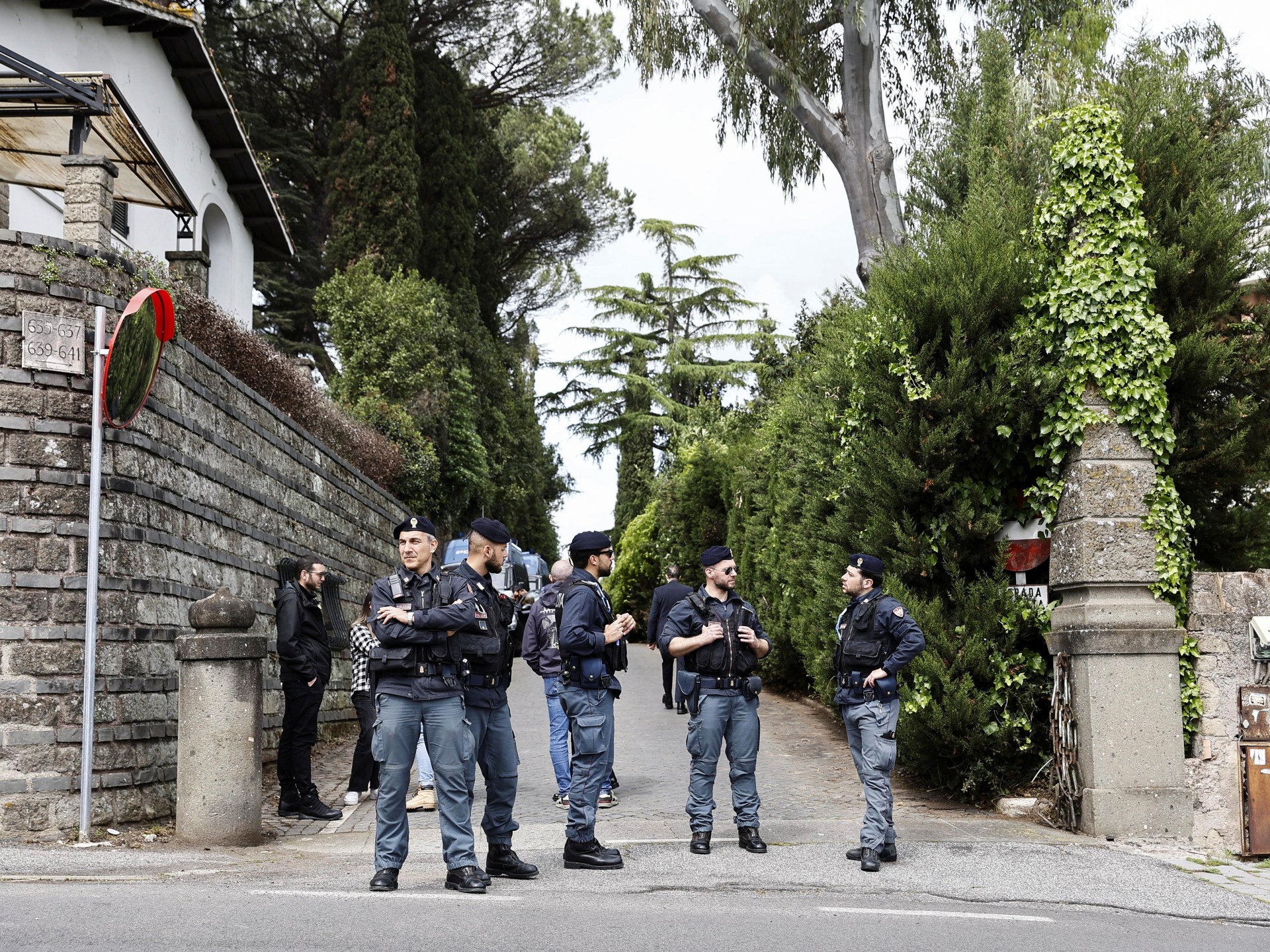
After technical talks, senior negotiators expected to reunite on April 26, according to Iran’s foreign ministry.
Iran and the United States have completed a second round of indirect nuclear negotiations, which Iran’s foreign minister has described as “constructive” and moving forward with further meetings planned in the coming week.
Abbas Araghchi and US Middle East envoy Steve Witkoff held four hours of indirect talks at Oman’s embassy in the Italian capital, Rome, on Saturday, according to Araghchi.
“We succeeded in reaching a better understanding on certain principles and goals,” the diplomat was quoted by the semiofficial Tasnim news agency as saying. “The negotiations were conducted in a constructive atmosphere and are progressing.”
There has been no readout yet of the meeting from the US side.
The delegations – led by Araghchi and Witkoff, a billionaire real estate executive whom US President Donald Trump has dispatched on numerous foreign policy missions – stayed in separate rooms in the embassy as Omani Foreign Minister Badr al-Busaidi shuttled messages between them, according to Iranian officials.
Iran’s Ministry of Foreign Affairs said the parties will hold more indirect, technical-level talks in the coming days, followed by another meeting with senior officials on April 26.
There were useful indirect talks today between Iran and the United States conducted by Oman Foreign Minister in a constructive atmosphere.
The two sides agreed to continue the indirect talks in few days at technical level to be followed by another round at their own level on…
— Esmaeil Baqaei (@IRIMFA_SPOX) April 19, 2025
“I hope that after next week’s technical sessions, we’ll be in a better position,” Araghchi said, according to Tasnim. “There’s no reason for excessive optimism or pessimism.”
‘Negotiations to pick up’
Al Jazeera’s James Bays, reporting near the Omani diplomatic compound in Rome, said the Iranian response was “very positive” for a delegation that “had seemed pretty negative going into the talks”.
Next week’s planned talks mean “the pace of negotiations is going to be picked up”, Bays said.
The latest meeting comes a week after Iran and the US came together in Muscat for their first high-level discussions since Trump in 2018 unilaterally abandoned a landmark nuclear accord signed and brokered by world powers in 2015.
The Iranians “are looking for a kind of consistency when it comes to the current talks”, Al Jazeera’s Tohid Asadi reported from Tehran.
Will US accept civilian nuclear programme?
Western governments, including the US, have long accused Iran of seeking to develop nuclear weapons – an allegation Tehran has denied, insisting its nuclear programme is solely for peaceful civilian use. On Wednesday, the head of the International Atomic Energy Agency, Rafael Grossi, said Iran was “not far” from possessing a nuclear weapon.
Grossi was also in Rome on Saturday meeting Italian Foreign Minister Antonio Tajani. Grossi’s nuclear watchdog would likely be central in verifying compliance by Iran should a deal be reached, as it did with the 2015 accord.
The US and Iran have had no diplomatic relations since shortly after Iran’s 1979 Islamic Revolution. After returning to office in January, Trump revived his “maximum pressure” sanctions campaign against Tehran, but in March, he sent a letter to Iranian Supreme Leader Ali Khamenei calling for renewed negotiations – while warning of military consequences if diplomacy fails.
“I’m not in a rush” to use force, Trump said on Thursday. “I think Iran wants to talk.”
On Friday, Araghchi said the US showed “a degree of seriousness” during the first round of talks but questioned Washington’s “intentions and motivations”.
Bays said the heart of the dispute remains whether Iran may maintain a civilian nuclear programme – or whether, as hardliners in Washington insist, it must dismantle its nuclear programme entirely.
“All they’ve been talking about last week in Muscat and here in Rome is a framework for the discussions and what they want to achieve,” Bays said. “They have not been discussing the nuclear detail, … and the devil is in the detail on these things.”
Middle East
Tunisian court hands opposition figures lengthy jail terms | Human Rights News
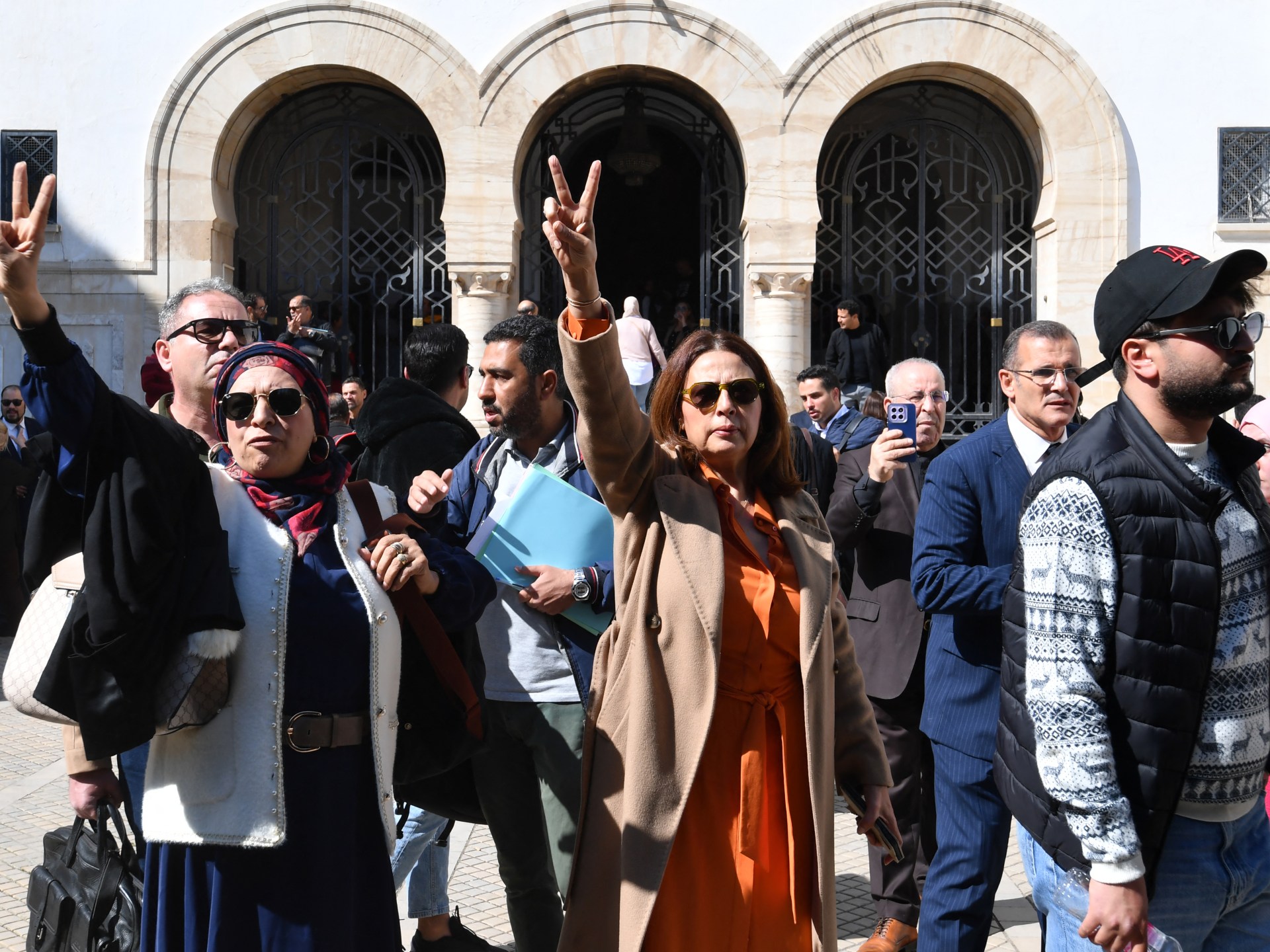
Dozens of defendants found guilty of “conspiracy against state security” and given sentences of 13 to 66 years.
Dozens of opposition figures in Tunisia have been handed lengthy prison terms on national security charges, according to state media.
A number of the North African country’s most senior opposition politicians were among 40 people sentenced on Saturday, including a former justice minister and diplomats. Critics insist the charges are trumped up and say they are symbolic of President Kais Saied’s authoritarian rule.
The TAP state news agency, quoting an unnamed judicial official, reported that the sentences ranged from 13 to 66 years.
An official from the anti-terrorism prosecutor’s office was quoted by Jawhara FM as saying the defendants were found guilty of “conspiracy against state security”, and “belonging to a terrorist group”, including liaising with “foreign powers” to undermine Saied’s rule.
The precise details of the trial remain cloudy, with the exact number of those on trial and the specific charges they face unclear.
It was not immediately clear either on Saturday whether all of the estimated 40 defendants in the case, which has become known as the “conspiracy case” and been running for two years or so, were found guilty and given prison terms.
About 20, many of whom have fled Tunisia, were sentenced in absentia, including the French intellectual, Bernard-Henri Levy, who is accused of being a conduit between defendants and foreign parties.
“President Saied has weaponised Tunisia’s judicial system to go after political opponents and dissidents, throwing people in arbitrary detention on flimsy evidence and pursuing them with abusive prosecutions,” Bassam Khawaja, deputy Middle East and North Africa director at Human Rights Watch, told Al Jazeera earlier this month.
On Friday evening, defence lawyers denounced the trial after the judge finished reading the accusations and began deliberation without hearing from either the prosecution or the defence.
“In my entire life, I have never witnessed a trial like this. It’s a farce, the rulings are ready, and what is happening is scandalous and shameful,” said lawyer Ahmed Souab.
Authorities have accused the defendants, who also include the former head of intelligence, Kamel Guizani, as well as media figures, of attempting to destabilise the country and overthrow Saied.
A number of the defendants – including Issam Chebbi, Ghazi Chaouachi and Jawhar Ben Mubarak – have been in custody since being detained in 2023. Chebbi is a member of the opposition National Salvation Front coalition.
“The authorities want to criminalise the opposition,” Chebbi said on Friday.
Saied rejects accusations that he is a dictator. He said in 2023 that the accused politicians were “traitors and terrorists” and that any judge who would acquit them would be an accomplice.
Saied consolidated his power in 2021 by dissolving the parliament and sacking the then-prime minister.
The opposition leaders involved in the case accused him of staging a “coup”.
They say the charges against them were fabricated to stifle the opposition and establish a one-man, repressive rule.
Some of Tunisia’s most prominent opposition leaders are already in prison.
Rached Ghannouchi, the head of Ennahdha, was arrested in April 2023 and sentenced to one year in prison on charges of incitement.
Earlier this year, he was handed a further 22-year sentence on charges that included plotting against state security. He was also sentenced to three years for accusations that his party received foreign contributions.
Middle East
Deadly, sombre Good Friday as 58 people killed in Israeli attacks on Gaza | Israel-Palestine conflict News
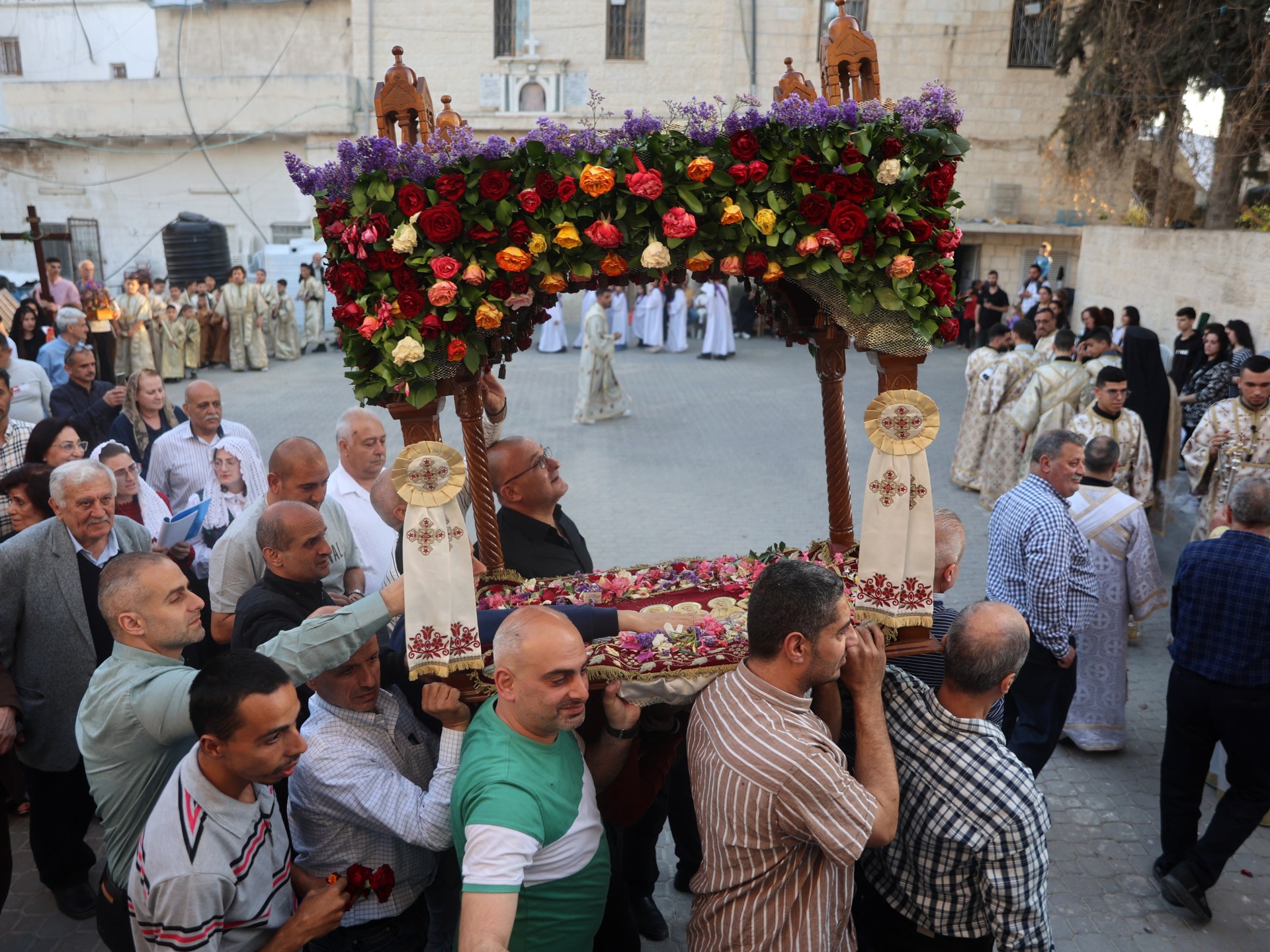
Palestinian Christians in Gaza and the occupied West Bank are holding temperate gatherings leading up to Easter.
Israeli strikes on Gaza have killed at least 58 Palestinians in one day as Christians mark Good Friday in the besieged and bombarded enclave.
More than half of the casualties were in Gaza City and northern Gaza, but deadly attacks took place across the Palestinian Strip, including in Khan Younis and Rafah in the south, medical sources told Al Jazeera on Friday.
The Israeli military said troops were operating in the Shaboura and Tal as-Sultan areas near Rafah, as well as in northern Gaza, where Israel has taken control of large areas east of Gaza City.
On Friday, Israel’s defence minister, Israel Katz, repeated that Israel intended to achieve its war aims.
“The [Israeli army] is currently working towards a decisive victory in all arenas, the release of the hostages, and the defeat of Hamas in Gaza,” he said in a statement.
Palestinian Christians in Gaza however continued to hold temperate gatherings leading up to Easter, amid the attacks.
Speaking to Al Jazeera from a local church, Ihab Ayyad said he used to gather with other congregants and visit his neighbours’ homes every year to celebrate.
“This year, we didn’t make the visits because of the total destruction everywhere, as the [Israeli] occupation forces have levelled most of the houses of my relatives and my neighbours,” Ayyad said. “A lot of my relatives and neighbours were martyred or displaced in different places. We haven’t celebrated because we feel very sad.”
Ramez al-Soury said he used to travel out of Gaza to Bethlehem or Jerusalem for the holy week.
But now, an “atmosphere of war” permeates Gaza. “The death smell is everywhere. The smell of killing and destruction is putting a lot of pressure on us,” he said.
Reporting from Gaza City, Al Jazeera’s Hani Mahmoud said the Christian community is holding onto their faith and has gathered at one of the oldest churches in the world in Gaza – not in defiance but in devotion.
“In Gaza, Good Friday is the power of faith and the quiet strength of those who still believe in peace even when the world around them is nothing but a stage filled with violence and death,” he said.
West Bank settler violence
Rituals to mark Good Friday and Easter have also been held in the occupied West Bank.
There are about 50,000 Palestinian Christians in the region. Israeli authorities, however, require them to acquire permits to travel to Jerusalem, making it difficult for many to join those celebrations.
Moreover, Israeli settlers and the military also attacked Palestinian people on their land in the town of Biddya, in the Salfit governorate in the occupied West Bank, according to Al Jazeera Arabic on Friday, tempering the celebrations.
The Palestine Red Crescent said that a Palestinian was injured in the attack.
Local sources also told Al Jazeera Arabic that dozens of settlers stormed Jabal al-Urma, a hill in the town of Beita in the Nablus governorate, under the protection of the Israeli army.
Settlers are Israeli citizens who live illegally on private Palestinian land in the occupied West Bank and East Jerusalem.
Israeli settler and military violence has soared across the West Bank – particularly in the north of the territory – since the war on Gaza began in October 2023. The United Nations has said this violence has displaced roughly 40,000 Palestinians since Israel began a new military operation in the occupied West Bank in January.
-

 Lifestyle1 day ago
Lifestyle1 day agoSweets from the sky! A helicopter marshmallow drop thrills kids in suburban Detroit
-

 Sports2 days ago
Sports2 days agoNY Rangers’ Panarin, MSG reportedly made settlement payments after employee made sexual assault allegations
-
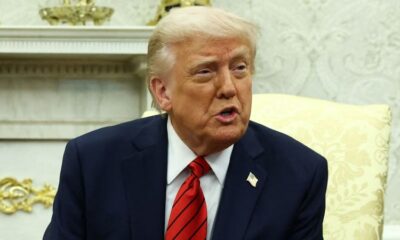
 Europe1 day ago
Europe1 day agoLive updates: Trump news, Ukraine peace talks, US immigration, tariffs and university funding
-

 Education1 day ago
Education1 day agoHarvard’s battle with the Trump administration is creating a thorny financial situation
-

 Sports1 day ago
Sports1 day agoAaron Rodgers ‘not holding anybody hostage’ as he decides his future, retirement a possibility
-

 Conflict Zones22 hours ago
Conflict Zones22 hours agoTrump says US may ‘pass’ on helping end war if Russia, Ukraine resist deal | Russia-Ukraine war News
-

 Sports2 days ago
Sports2 days agoLos Angeles Rams honor first responders by conducting 2025 NFL Draft from Los Angeles Fire Department
-
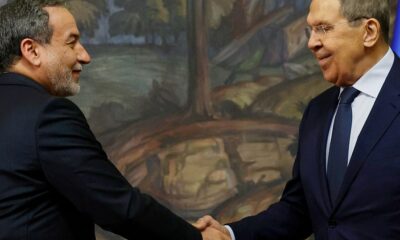
 Africa1 day ago
Africa1 day agoIran seeks Russia’s support for its nuclear talks with US




